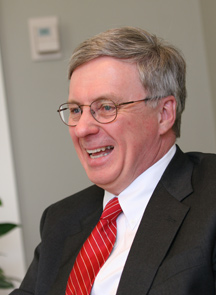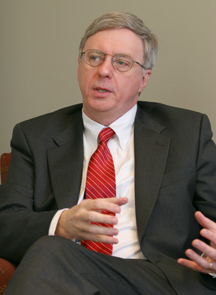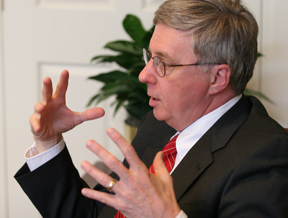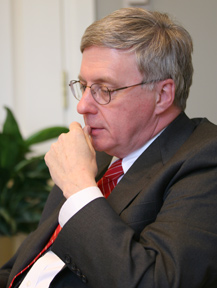 The public affairs team had the opportunity to catch Wabash President-elect Pat White for a little Q&A time during a recent campus visit. He was here as part of the search for a new dean of the college:
The public affairs team had the opportunity to catch Wabash President-elect Pat White for a little Q&A time during a recent campus visit. He was here as part of the search for a new dean of the college:
Wabash: How did you become acquainted with Wabash?
Pat White: I heard of Wabash when I was a little kid growing up in Illinois, but I didn't know much about it.
I went to College at the University of Chicago, and we were snobby about our distinction as intellectuals, in particular we knew we were better than Harvard., yet we had great respect for a handful of small colleges in the Midwest — Earlham, Oberlin, and Wabash, for example.
But Wabash really got on my radar screen when Don Herring, who was one of my teachers at Chicago — I actually had him for a course in Victorian literature — left Chicago to come to Wabash. Don Herring was one of the most joyful teachers. He taught me that teaching literature should be a great joy. And by extension, the liberal arts experience shouldn't be gloom and doom no matter how hard the comps are, no matter how hard everything else you go through is. The liberal arts should be an experience of great joy. So when Don Herring left Chicago to go to Wabash, we gained even greater appreciation for Wabash. Now, it's one thing to be president of Wabash College, but to be in the same department [English] with Don Herring, for me, is incredible.
So I've known about Wabash for a long time. Frankly, when I first heard about Wabash seeking a president I said, 'Man, it's just too high a mountain to climb.' I knew that you were going to get great candidates from all over the country because this is Wabash. But then I said to myself, 'If you ever wanted to be a college president, Pat, what would be a better place? If not now, when? If not Wabash, where?'
WC: Did you see something working in your favor as a candidate?
PW: My broad range of experience working with folks in student affairs, with many parts of a college such as development and admissions, as a plus, even more so than having spent nearly 18 years at a single sex school. That really hit me the moment I arrived on the Wabash campus.
Eighteen years ago when I interviewed at Saint Mary's for the associate dean's job, I walked into a room of students after interviewing for two days with everyone under the sun. I thought, 'Piece of cake - I'm a good teacher and I've been talking with students most of my life.' And they took me apart. It was clear to the students that Saint Mary’s was their college, and if I was going to be good enough to work at their college, I was going to have to answer their questions.
I hadn't really thought much about that experience when I went to talk to the students for the first time here at Wabash, but the minute I started talking with them, I knew I was talking to the men of Wabash. Wabash College is their college, and I need to respect that. So, I think [my realizing that] was one of the things that might have differentiated me from the other candidates.
WC: How do you put that student centeredness into practical application when you arrive here in July?
PW: That's a very serious question. I could say, 'I'll always have an open door,' and I want to be accessible, but I have to do more than wait for students to come to me. The president of Wabash must find a way to engage students in the central issues of the campus and learn from students.
It is vital the Wabash president takes the students seriously. I don't know exactly how that will play out in practice. I don't know enough in 15 days about the structure of student leadership. I have to understand the channels by which students can affect change on this campus.
I also want to ask students what they want change to accomplish. If they want to change, for example, Cultures and Traditions, or fight to keep it the same, I'd really like them to think about it and tell me, 'How do you want Wabash College to be even greater as a result of the change? If you want to change Cultures and Tradition, we'll talk about that, but let's put the larger question first — the big question.'
Every class at Wabash should leave its mark on the institution. When I greet students in the fall I will tell them I am happy they're here not just because we need students, but because we're going to be a better college because they are here. We're going to be a stronger college because they are here. If you say to 18 year-olds at Wabash, "How are you going to change this into a better institution?" you have articulated an incredibly maturing promise for students.
 WC: What do you think of Wabash traditions?
WC: What do you think of Wabash traditions?
PW: At any college where most of the students are between 18 and 22, students are going through colossal changes in their lives. Changes in their relationship to community, relationship to family, and their relationship to who they are. One of the things that tradition does is to give them a place to stand. So they can change all kinds of other things in their lives, because they're keeping things that might seem to the outside world relatively trivial.
When I was at the University of Chicago, we'd be on our way to shut down the administration building, but we wouldn't step on the bronze phoenix in the middle of Hutch Commons because if we did we'd flunk our comps! We were kids who imagined ourselves to be radical, but we'd step around that rectangle, partly because we were embedded in what was one of the most traditional bits of curriculum in the history of higher education in America. So you're reading Thucydides in the morning and shutting down the administration building in the afternoon. Go figure.
WC: Has working at a women's college prepared you for Wabash?
PW: One similarity is that because Saint Mary's is a women's college and Wabash is a men's college, we think of them as special places. There's a bit of combativeness: 'Wabash always fights.' There's a bit of a chip. At Saint Mary's, the students say, 'Don't tell me I'm not as good as those women who go to Notre Dame.' Both my daughters were accepted at Notre Dame and Carleton, but they chose Saint Mary's. People have coronaries when they hear they were accepted at Notre Dame but came to Saint Mary's. But they are very happy and proud of their college, and their experience and learning have been very rich.
There's a bit of a sense of questioning at women's colleges, and certainly at men's colleges: are we artifacts of the past? Are we dinosaurs? So in some cases the two schools are not very different.
But in other ways, they are. Women's colleges have a presumptive pass in our culture; it's assumed they're pretty good things because women have been denied for a long time. For the men's colleges, partly because there are only three, we don't have that same presumption that somehow men need a place of their own. So that's different.
 WC: Newsweek magazine just did a cover package about how education isn't working for boys.
WC: Newsweek magazine just did a cover package about how education isn't working for boys.
PW: I glanced through that to see if it mentioned college at all. And essentially, it characterizes this as a K-12 problem. I don't think that's accurate. Men aren't going to college at the same rate as women now, and they're not succeeding when they go to college. That's where Wabash has a real opportunity to be a leader in explaining what Wabash is doing right, so that other schools can do better for men.
I think Wabash has to articulate for itself what it is that it's doing well so that it can communicate to parents not what's so strange about going to a men's college, but what they should be looking for in any college. You want your son to be successful, to do good work, to transform his mind while still staying connected to his community. Wabash can demonstrate that it does those things very well.
At Saint Mary's we sometimes talk about how only 2-3 percent of young women even consider a women's college. And it's probably even less for men considering a men's college. We can wail and gnash our teeth about that, but that seems to me to be the wrong issue. It's not whether they consider a men's college or a women's college, but how do we get these students to consider going to a place where their lives will be transformed, where they'll be able to do things they never imagined they could do, where they'll get a great education, where they'll live in community with people who will be exciting, and wonderful, and they'll have a lot of laughs, and where they will be cared for and thought well of and be part of a community that will last for the rest of their lives. That is what women's colleges, and this particular men's college, deliver.
So am I going to ignore that we're a men's college? No, of course not. But it's not just about just being a men's college, but what happens at this particular men's college. Let's shift the argument a little bit so that it's not about just being a men's college, but about the education that happens at this particular college for men.
WC: You have said that, "a president needs to be an extraordinarily good student."
PW: You're right. I think a president also has to be very good at channeling the thoughts of others. That's why I want to know why the students like it here. I want to interrogate them about that. Not just, 'Well, it's small and friendly,' but how is Wabash different?
WC: Have you had much time to think about the Center of Inquiry in the Liberal Arts and how it could be part of the pulse of identifying some of these characteristics?
PW: Enough to know that the Center must be a part of our identity. Some of it is very clear in the college's role in the national study [Wabash National Study of Liberal Arts Education]. That study is very important, as it positions Wabash at the center of inquiry in the liberal arts. If you want to talk about liberal arts outcomes in higher education and you happen to be at Amherst or the University of Michigan, then you have to come to Wabash to meet with other people who are doing this. And that's very important for positioning Wabash in higher education discourse.
So the Wabash National Study draws attention to the college, but the question I have for students, faculty, and the leaders of the center is, 'What role do we want the Center of Inquiry to have at Wabash?' At Saint Mary's, we've done a lot with our Center for Women's Intercultural Leadership. It's furthering some of the diversity issues on campus, including diversifying the student body.
 WC: Tell us about your time at Saint Mary's.
WC: Tell us about your time at Saint Mary's.
PW: Everyone at Saint Mary's was talking about two things when I arrived: the Saint Mary's woman has a particular kind of character and our students are not very intellectual. They're smart enough, but they don't consider themselves intellectuals.
So one of the first grants I wrote was "The Saint Mary's Woman: Towards Intellectual Leadership." What I did was to design programs to help students think about their intellectual ambitions, ways in which leadership connects to intellectual ambition, and ways in which the work of academic life connects to life outside of the classroom. We engaged as a consultant a wonderful scholar, Helen Horowitz, who had written a book called Campus Life: A history of students in college. She came to our campus and said, "Your students work really, really hard, but they don't seem to be enjoying it very much. And they also know their grade point averages out to three digits." We learned that our students were really ambitious, but — to get back to what I learned from Don Herring — where was the joy? I was the joy guy, so we created this wonderful program called the Play of the Mind and for 13 years we brought women together to bring back the joy of intellectual life and the joy of leadership. We invited student development professionals, faculty, and students from other colleges to come to Saint Mary's and work under the following premise, "Intellectual life doesn't just happen in the classroom, but outside the classroom. What are the problems at your institution, and how can you learn to handle them?" And that's where the leadership came in. One of the biggest mistakes any administration can make is to restrain the power of student leadership. At the Play of the Mind, I had no idea what the students would come up with. Other colleges brought their best and brightest, and sometimes their most revolutionary students.
There was one student from Saint Catherine’s who just ran us up and down at this thing. About a year and a half later, their dean of students told me that this student came back, quit her job at editor of the student newspaper, and said it was useless to try to change things at Saint Kate's because everything's happening at Saint Mary's. She said, "That's clearly the place where intellectual life is going on."
WC: You seem very upbeat.
PW: I said to people when I interviewed here that I want to be in a place where there's joy in learning and joy in working together. I don't want to be a part of a gotcha culture. One thing I really like about Wabash is that it's not complacent. No matter how much money we've got, how good the students are, no matter how much alumni support, Wabash is never complacent. I think that may be due in part because we know we're a rare bird in American higher education.
WC: What do you do for fun?
PW: Some of my friends who were references would call me a workaholic, but I don't think I am. I really get a kick out of my work. I get a kick out of working with people. This is fun stuff. This is the game.
I have a habit of turning my amusements into modest work. I love going to art galleries, so then I tried reviewing art to support my trips to art galleries. What I learned is that you don't make very much money. I would drive 250 miles to Des Moines and make $15 from the New Art Examiner for the review. My wife allowed as how that wasn't a very good investment.
I run, occasionally, though not enough. I was a two-miler in high school.
Another thing I enjoy is hanging out with my kids. I have two daughters who are juniors at Saint Mary's and a son in medical school at IU.
I also love movies, but I taught film for 20 years. Back in college, my friends and I would go to movies all the time. And when they asked me what I thought, I always said the same thing. They knew I liked everything; I'm polymorphously appreciative of anything that flickers on the screen.
WC: Do you like Woody Allen?
PW: Woody Allen to me is one of the greatest arguments for the liberal arts in the history of the world. The liberal arts aren't necessarily going to make you rich. Not necessarily any happier. But you are going to get more jokes. There's a line in Annie Hall where Diane Keaton’s Annie is considering going back to college, and Woody Allen says, "Don't take any course that makes you read Beowulf." And, to X-percentage of people in the audience, that's just a nonsense statement. They may not have any idea who or what Beowulf is. Or why that's funnier than "not reading Chaucer."